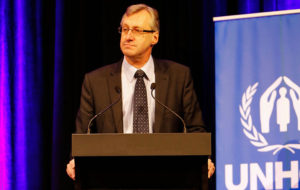‘Humanity in practice’ an natural instinct
Being responsive to the particular needs of each individual refugee was the key to truly successful refugee settlement, according the United Nations High Commissioner for Refugees’ man in Australia, Thomas Albrecht.
 Speaking at the Settlement Council of Australia (SCOA) triennial conference, Mr Albrecht said to want to help people in dire need was a human instinct that was apparent in Australia’s approach to refugees and in the actions of ordinary people.
Speaking at the Settlement Council of Australia (SCOA) triennial conference, Mr Albrecht said to want to help people in dire need was a human instinct that was apparent in Australia’s approach to refugees and in the actions of ordinary people.
“Every country has a different approach but I think also it’s important to compare the different approaches and to learn from each other. But I think the most important element is to be responsive to the particular needs of each individual refugee – that is what makes for quick and effective settlement,” he said.
“That usually makes settlement quick, and effective, and successful.”
Mr Albecht also spoke of what he termed ‘humanity in practice’ in speaking about differing approaches to refugee settlement.
“I believe humanity in practice is the same here as it is everywhere around the world; where you have human beings when they see others suffering, when they see others persecuted, when they see others fleeing to find safety, then they want to help,” Mr Albrecht said.
“Most people would do that as a natural instinct, and I think that’s what we see here in Australia here as well, beautifully illustrated with a lot of the colleagues that work in settlement of refugees, and where they have established very, very heart-warming practices throughout many decades,” he said.
Mr Albrecht lauded Australia’s humanitarian settlement practices and program while criticising the federal government’s offshore processing policy and its treatment of asylum seekers.
“I think on the settlement side, certainly Australia has very good programs that are responsive to the needs, rather than just prescribing one solution only that has to fit for every human being who arrives as a refugee or asylum seeker here,” he said.
“And I think that is a hallmark to have responsibility sharing is a very well demonstrated way where the refugees are part of the solution,” Mr Albrecht said.
“I think from the settlement perspective, for those who come here to Australia it is comparable to what happens in many other parts of the world but there is a great partnership here in terms of third party resettlement and the settlement practices.
Mr Albrecht is the Regional Representative of the United Nations High Commissioner for Refugees in Canberra, with geographical responsibility for 16 pacific countries.
His role is to work with governments and other partners to ensure all persons of concern to UNHCR, including refugees, asylum-seekers and stateless persons, receive protection, assistance and durable solutions to their plight.
He is also keen to promote long-term cooperation on the protection of persons of concern in the region, and to increase understanding and support for refugees worldwide.
Prior to taking up this assignment in early 2014, Mr Albrecht served as Head of the UNHCR Regional Support Hub in Nairobi, which, in close collaboration with the Organization’s Headquarters, works with offices in the East and Horn of Africa as well as the Great Lakes Region to ensure strategic coherence, programme quality and results, management effectiveness and financial due diligence and accountability for UNHCR’s operations.
From 2005 to 2009, Mr Albrecht served as Deputy Regional Representative at the UNHCR Regional Representation for the United States of America and the Caribbean, located in Washington.
His responsibilities there included overseeing the protection of refugees, internally displaced persons and stateless persons in over 20 countries and territories of the region as well as finding lasting solutions to their problems.
Ruby Brown
AMES Australia Staff Writer












